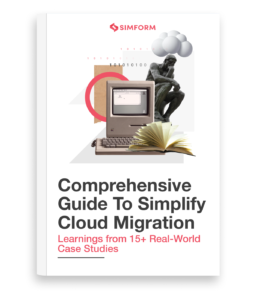Concerns of IT operations and software development communities over a fatal level of dysfunction in the industry gave momentum to the DevOps movement. Simultaneously the rapid evolution of containers changed the dynamic of modern IT infrastructure. And now, what’s become a hotter topic than all is Docker – a container that can run apps on the same old server or OS. Most importantly, there are many docker use cases that your business can benefit from.
For instance, being an early leader in technology, GE Appliances faced the unavoidable drawback of accumulating legacy practices and legacy data processing systems. Accordingly, the development-to-delivery time for their applications was around 6 weeks on average, with a largely manual delivery chain. Besides, an initial migration to the cloud failed to eliminate many existing practices.
Finally, GE appliances switched to Docker, which allowed them to build key services around the open platform with a greater density of applications. This was impossible earlier with virtual machines. Moreover, they could support legacy applications and accelerate the migration from ancient (mid-20th century) legacy data centers.
That being said, you could be one of the next organizations to leverage Docker in DevOps to create ready-to-run containerized applications. We will walk you through everything you need to know about Docker in this blog.
Clearing the confusion: 3 common myths around Docker
Feeling like you are on uncharted waters? Fret not! Before we dive into what Docker is, let us squash out some common misunderstandings about Docker to ensure you are on the same page with us.
#1 Docker is all-or-nothing
Many small and medium enterprises tend to believe that they have to use Docker to evolve the apps’ entire architecture. However, that is not the case as Docker is compatible even with an app built on a LAMP stack, given you isolate APIs and necessary web services.
#2 Without the cloud, Docker cannot be implemented
Cloud services are the talk of the day in terms of automation, storage, development, and whatnot. But there is no mandatory requirement that indicates that your app should be on the cloud to use Docker. Sure, Docker offers various benefits with cloud services, but the requirement of your app comes first. Just because it provides a virtualized OS, it does not mean you have to migrate towards the cloud.
#3 Security concerns with Docker is high
Though DevOps and containers have been practiced and used for years within the IT industry, Docker is still new. In light of the security concerns that come with Virtual Machines (VMs), many businesses falsely believe that Docker is prone to security breaches or is inherently insecure. Though that may have been true in the past, currently, Docker uses Kernel-level security via virtualized servers. Therefore, Docker is secure as any other platform can be!
Use cases of Docker containers: Fundamentals you should know
Containers can be considered a platform, an app layer abstraction, or a virtualized OS that helps package everything coded for an app in one machine in the form of a bundled image or a file. This bundle, for instance, will consist of all libraries, resources, codes, etc., required to run the app under development on another machine without any extravagant prerequisites.
Imagine the considerable amount of development time and cost you can save, especially while evolving your software architecture or migrating towards the cloud or something new. It’s a game-changer!
So, what is all this hype about Docker? You might wonder, what is Docker?
Docker is a container that functions in the form of Platform-as-a-Service (PaaS) and focuses on OS-level virtualization.


What is Docker used for?
For starters, when your development pipeline involves the usage of multiple computing environments, Docker would help create an environment with standardized instructions. In other words, Docker would help to reduce the inconsistency between different systems and avoid repeating any development task.
Moreover, everyone involved in the project would be working in the same computing environment. For instance, Docker-compose is used to create a configuration file committed to a particular code repository. Any team member can access this file, create their own and respective development environment according to their system, and maintain code consistency. Being able to configure faster is just the icing on the cake!
But that list of examples of where and how Docker can be used does not stop at that. Why are companies embracing them? What’s the reason behind it being so popular besides its development advantages? Let us draw a clear picture of that by venturing into what are the benefits of Docker.
- Portability: Easily transfer and publish the same changes in all development machines irrespective of which team member makes a new addition or a change.
- Reusability: Reuse components created in one machine on another n number of times as per requirement for two or more different purposes by forking them as desired.
- Computing environment isolation: Regardless of the platform the application is deployed, everything, including the code, dependencies, and more, will stay consistent. Improved productivity considerably!
- Mobility: Docker is compatible with most used parent platforms like Linux, macOS, and Windows. It can run anywhere, provided there is one targeted OS.
- Testing: Docker-based result files are images. These images are versioned and can easily be rolled back for any iteration. This methodology supports Continuous Integration (CI) and Continuous Deployment (CD) practices for continuous testing at any given time.
- Scaling: Without any massive architecture overhaul, apps with small processes can be built inclusive of internal API collaborations at scale. In simple words, you can create apps with room for scaling as per your desire.
This is just a bird’s eye view of the benefits you can reap by using Docker. The list keeps increasing!
Docker use cases for businesses
1) Adoption of DevOps
Companies evolving their apps’ software architecture or are startups may struggle to keep up with the changing technology and market expectations. In such cases, DevOps implementation helps build and deploy apps faster, or features, are known facts. But Docker adds more icing to the cake on that front as an irreplaceable tool.
At any given time, in any computing environment, Docker guarantees that a feature developed or an app created in the development environment will work in staging and the production environment. You can also roll back to old versions or the newer ones at your convenience. Given such effective particles, Docker in DevOps seems to provide seamless control over changes to be made in an app flexibly. The possibilities that Docker use cases offer are almost limitless similar to the possibilities you can obtain from cloud services.
2) App infrastructure isolation
If you are a business already practicing DevOps or into software evolution, you might be aware of the issues that arise in the name of dependency hell. When you install a software package created on one machine on another, there are issues that the DevOps team may face in running apps with specific versions, libraries, dependencies, and so much more.
With the help of Docker, you can run multiple apps or the same app on different machines without letting something as versions or other such factors affect the development process. This is made possible as Docker uses the kernel of a host system and yet runs like an isolated application, unlike VMs. This helps build apps where infrastructure can be isolated from the computing environment requirements during development. It also reduces a considerable amount of hassle and confusion in DevOps collaboration between teams.
3) Multi-tenancy support
When building an application that requires multi-tenancy, the development process may get complicated given the numerous dependencies and independent functions involved. Managing the development operations may become challenging to handle. Moreover, rearchitecting the app may also be required in some cases, which is a headache and time-consuming. Not to mention the cost your business would have to incur.
With the help of Docker, you can quickly isolate different computing environments, as mentioned a couple of times in this article. Development teams will have the power to run multiple instances of the application tiers on different tenants, respectively. The increased speed of Docker to spin up operations also serves as an easy way to view or manage the containers provisioned on any system.

4) Improvement in software testing
Application development involves testing, a necessary process that cannot be simply ignored. The amount of effort and procedures that go into the types of testing conducted and test cases created for every development and deployment process is tedious. Multiply the headache when the test has to be conducted on different machines. What if you can run all your tests automatically? Moreover, what if you can simultaneously isolate your development tests from deployment tests?
Dockers help your business to accomplish just that. It reduces the number of attempts required to rerun tests. If tests fail on the clients’ end, they will also fail on the local machine. In other words, test results will be the same in all computing environments.
5) Smart Disaster Recovery (DR)
Committing the development pipeline to one OS or a couple of assigned machines is always an excellent plan to keep discrepancies under control. Yet, not all challenges can be foreseen. What if the data, transferred to a new machine, is corrupted? Though Docker can handle dependency issues, can it manage such data storage corruptions?
The answer is yes. With the help of Docker use cases, you can instantly create and destruct container tasks as you please. Furthermore, Docker provides possibilities to commit your data within the container platform before the image file is transferred to another machine. This way, even if something goes wrong, you can use the Docker images to restore your data. Moreover, if your business is already using the cloud or considering migrating towards the cloud, you can set up a DR plan on the cloud zone at ease.
6) Continuous rapid deployment
Gone are the days when deployment began only after development processes were complete. DevOps and Docker together manage to reduce deployment to seconds. Before Docker, applications built had to be run on the parent server and environment before making it live on any other environment. Not to mention the configuration management and maintenance of consistency in versions that increase the deployment time.
With Docker, you can easily run the app on any server environment, and evidently, it also provides version-controlled container images. Furthermore, stage environments can be set up via the Docker engine, which enables CD abilities.
7) Creation of microservices architecture
Organizations, be it small or large, are actively adopting microservices replacing monolithic apps for various reasons such as scalability, performance, etc. However, it is fundamental to be aware of the issue that microservice architecture may pose regarding dependencies since architecture is broken down into individual and smaller components.
Containerization with Docker provides the ability to isolate these individual components into different workload environments. Thus, teams can independently work on their assigned components and yet deploy and scale them simultaneously by collaborating with other component-related teams. Specifically, Docker Hub and Docker Desktop focus on running microservice-based applications if you are interested.
8) Migration of legacy apps to containers
Time to remind you again that Docker is not only for advanced application development. Even if your business has a legacy app, it can be migrated to containers. So if you are initially considering not building or evolving towards microservices, you can simply use a lift and shift approach to move your existing app to the container platform.
You may not reap immediate gains since the leap from legacy to containers is vast. However, it will help you containerize your app with DevOps practices, leading to numerous benefits over time. Furthermore, even if you use the LAMP stack, Docker will still be compatible with your requirements. Food for thought!
Build an Enterprise Kubernetes Strategies like Spotify, GitHub and other Tech Superpowers
9) Simplification of code configuration
The most significant advantage of a VM is its ability to run on any given platform with its own configuration on top of the infrastructure your app follows. While Docker seems to fulfill the same, it avoids the overhead you may incur using a VM. Unlike a virtual machine, with Docker, you can create your own configuration and set it up on a supporting computing environment that you created.
In addition to that, you can accomplish all this in the form of simple code and deploy it as per the requirement. Imagine the possibilities you can obtain from such a use case. You could also describe this as the decoupling of infrastructure according to the application environment. With any extra hardware or complicated coding, obtain the freedom to run your app across any PaaS or IaaS.
10) Management of development pipeline
As stated above, Docker supports different computing environments. Given that, when developed codes are transferred between different systems to production, there would be many environments it passes through. The code would be influenced by minor changes or differences at each development phase in each environment. For instance, without Docker, the modifications incurred along the way could be irreparable, resulting in inconsistent codes and infrastructure.
However, with Docker, the development and deployment pipeline can strictly maintain consistency in coding, infrastructure creation, and even in the usage of resources. Furthermore, Docker’s resulting image file helps achieve a zero-change state in the written code even when it passes across countless development environments and production phases.
11) Increased developer productivity
Any good software project will focus on writing codes that are close to production as much as possible and create development environments that are fast and interactive. With the help of Docker, a development environment can be built with low memory capacity without adding an unnecessary memory footprint to the memory that the host repository already holds. A dozen services can run at low memory with Docker.
Since Docker also supports sharing data volumes, it helps make the application code available on any host OS container even if the environment is running on a VM. Furthermore, given that the same VM is present in all development systems, the data volumes, despite being stored in different folders, can be synced across all systems since it all runs on a host OS. All this proves to be a beneficial aspect for improving the productivity of development teams.
12) Consolidation of server requirements
Docker provides a powerful consolidation of multiple servers even when the memory footprint is available on various OSs. Not to mention, you can also share the unused memory across numerous instances. With such a possibility, you can even use Docker to create, deploy and monitor a multi-tier app with any number of containers. The ability to isolate the app and its development environments is a boon offered by Docker. While it may involve different servers in some cases, even those can be consolidated to save cost.
One may wonder if such a server consolidation may result in a decline in performance. However, with Docker, since the development environment is virtualized, performance decline is negligible, and that’s one of the upsides of using it.
13) Porting across cloud providers
The age of containers and Docker is already on the rise. Almost all the cloud service providers have started supporting Docker-based operations today. With that statement, there is a rise in the likelihood of migrating your app to the cloud or creating a cloud-ready app from scratch to implement DevOps methodologies for your development and deployment processes. So why set up your app to run locally when it can run on the cloud? Simply your workflow as best as possible!
Docker uses cases for various industry verticals
1) Healthcare
National Institutes of Health (NIH) have been using containerization technology, especially Docker, for its mobility and flexibility in delivering imaging software services to more than 40 hospitals in the US. It also uses Docker to curate data from different websites and integrates it with Artificial Intelligence (AI) to help doctors make informed decisions.
NIH leverages Docker to use containers to test new imaging technologies in the hospital sector. It also allows it to implement continuous integration and testing practices with all hospital collaborators and ensure that the latest technologies are used.
2) Media and entertainment
With the rise of containers, Netflix decided to use Docker and create its own infrastructure to execute deep functions with its integrated Amazon EC2 services. This project was called Titus.
At Netflix, Docker was used in Titus to specifically help with deployment and serve as a job scheduling system. Users are created in batches in this platform, and Titus helps create sophisticated infrastructure at a fast rate, assisting developers in specifying the exact code and dependencies required. With the combination of Linux and Docker, Netlflix also implemented their own multi-tenant isolation. This helps to deploy new updates faster and also cater to users with detailed preferences.
How Netflix Became A Master of DevOps?
3) Travel
Carnival Corporation is a British-American cruise operator controlling more than 100 vessels. It wanted to digitize various operations and transform the experience for guests by letting them interact and participate more by personalizing their needs. So it has a program known as The MedallionClass, where more than 300 services are deployed across a cruise ship via this program built with Microservices Architecture.
This MedallionClass program uses a hybrid cloud infrastructure, and with the help of Docker, Carnival Corp. can deploy services to any ship and also run them to improve the guest experience at any given time. In simple words, Docker helps to connect various elements such as food, beverages, accommodation, transportation, etc., on its cruise ships. Ultimately this serves to imitate each cruise ship as a mobile city.
4) FinTech
Knowis is a digital banking solution provider. It undertook the steps to migrate away from monolithic to modernized architectures that support container technologies. Creating a scalable application infrastructure to satisfy expanding banking markets is often the primary goal for banking sectors.
With the help of containers such as Docker, Knowis is able to react flexibly to the market requirements. It also leverages container orchestration via Kubernetes to balance the workload as well. This way, the IT performance of banks remains stable even under multiple access and higher loads.
5) eCommerce
Alibaba Cloud provides cost-efficient possibilities for startups and Small and Medium Businesses (SMBs) to create eCommerce websites. It may be a competitor of other cloud platforms. But the USP of this platform is catered towards eCommerce.
It allows developers to use Docker to run as many containers as needed instantly and simultaneously process various operations in a given website in a short time. Moreover, it can be integrated with Magento CMS to manage content in the website as per the business vision. Furthermore, all this can be accomplished in a containerized environment.
6) Education
Wiley Education Services (WES) provides online educational services to more than 60 higher educational institutions. It aims to connect higher education partners, and in this process, the development team leverages multiple technologies. One of them is Docker, which has helped it innovate and experiment with creating architecture with room for scaling.
The foremost benefit, Dockers, brings to the WES table is the ability to get one of its websites up and running in the marketplace in no time. This helps to connect students with partners faster. Docker helps close that gap furthermore by allowing teams to quickly create, test, and publish containers at will at a budgetary price.
When not to use Docker?
If your business is interested in the usage of Docker, all the above-mentioned would be good places to begin with. However, there are also occasions when not to use Docker. In our experience, do not use Docker, if your
Product is desktop app
Docker is best for current web apps since it requires server-based software. On the other hand, building a desktop app requires a rich GUI, On the other hand, building a desktop app requires a rich GUI, and Docker, at present, may not meet all its requirements in terms of interface or computing environment. However, in the future, this may change.
Project is simple and small
Docker is helpful to keep track of dependencies and multiple functions if the architecture is vast. In the case of an app with small architectures or simple infrastructures, the usage of Docker could get underrated. Avoid spending unnecessary time and tools at this point. Use Docker when your app grows exponentially.
Development pipeline involves multiple OSs
Docker can run natively on Linux and Windows by default today. It also, however, supports running on macOS. Yet, containers created use the host system’s kernel, and there is no possible way to create a container that uses a different kernel on another system. You may overlook this backdrop if your app doesn’t use any kernel-based function.
On the other hand, if you need to use kernel capacities, you would require a VM to run containers on different machines. This may create more complications unless you have the right experience and understanding of managing all the above.
Requirement is to only boost app performance
Docker eases development processes and increases productivity. The ultimate result of all this is often an increase in the app’s performance as well. However, such an increase is a complimentary result of other improvements in operations. So, if you are wondering if you can leverage Docker just to increase your app performance, our suggestion is to refrain from using it for the time being. Instead, pick other tools and practices that directly help improve performance to save cost and avoid unnecessary complications at your project’s early stages.
Project needs easily managed technology
Docker is still a new technology. Still, many enterprises and developers struggle to understand it and focus on how it is well connected with DevOps, Cloud services, and Microservices. The documentation of Docker is falling behind the pace at which the technology is advancing too. Implementation of Docker also comes at a cost and requires efficient communication between various containers and teams involved. Hence, if you are looking for an easy technology that can be set up quickly, do not choose Docker unless your project is vast and you have the resources to expand.
What’s next? – The conclusion
According to a study, the application containers market was predicted to be more than $4.3 billion in 2022. And when big companies like The New York Times, PayPal, Spotify, Uber, and many more, overcome various challenges by using Docker, other businesses also get the motivation to employ its use. In fact, Docker has evolved at such an astonishing pace that a mere mention of containerization makes us think of Docker.
And now, it is clear that the list of Docker use cases does not stop just at best practices. They almost revolutionize the way development and deployment processes can be practiced. From running web apps, APIs to desktop apps on the cloud or local servers. Interested to know how you can implement DevOps and Docker?



